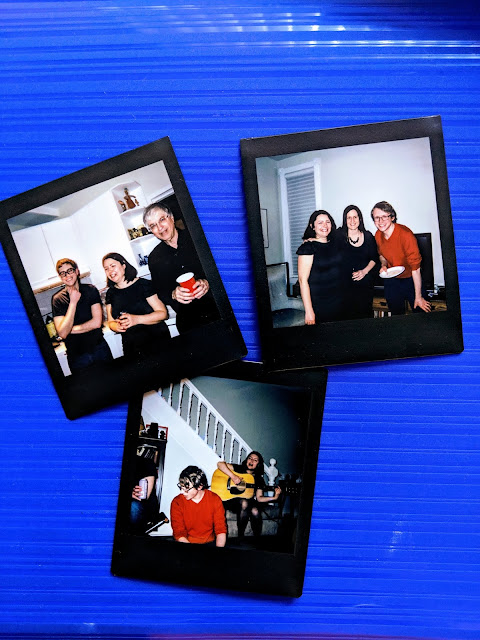Linguistic Society of America
Sali A. Tagliamonte (faculty) and Bridget Jankowski (staff; Ph.D. 2013):
"Grammatical convergence or microvariation? Subject doubling in English in a French-dominant town."
Becky Tollan (Ph.D.) and Lauren Eby Clemens (State University of New York at Albany):
"Syntactic ergativity as absolutive movement in Polynesian."
Sali is also presenting a poster:
"Wait, it’s a discourse marker! Catching a recent innovation in linguistic change."
Derek Denis (faculty) and Alexandra Motut (Ph.D.) are presenting a poster:
"Data collection reciprocity as service-in-return: A case study in working with community partners."
Julien Carrier (Ph.D.) also has a poster:
"Inuktitut complex nominalization."
Monica is also part of a talk with Patricia Schneider Zioga (California State University, Fullerton):
"Partitive case and abstract licensing in Kinande."
Clarissa Forbes (Ph.D. 2018, now at the University of Arizona) is presenting a poster:
"Ergative agreement switch and unlicensed absolutives in Tsimshianic."
Julie Goncharov (Ph.D. 2015, now at the Hebrew University of Jerusalem) and Monica-Alexandrina Irimia (Ph.D. 2012, now at the University of Modena and Reggio Emilia):
"Counterfactuality, focus, and embedded exhaustification."
Julie Anne Legate (MA 1997, now at the University of Pennsylvania) and Milena Šereikaitė (University of Pennsylvania):
"Lithuanian evidentials and passives of evidentials."
Paulina Lyskawa (MA 2015, now at the University of Maryland) is part of a talk being presented by a large team that also includes Hanna Muller (University of Maryland), Phoebe Gaston (University of Maryland), Bethany Dickerson (University of Massachusetts, Amherst), Adam Liter (University of Maryland), Karthik Durvasula (Michigan State University), Mina Hirzel (University of Maryland), Kasia Hitczenko (University of Maryland), Margaret Kandel (Harvard University), Jacqueline Nelligan (University of Maryland), Maxime Papillon (University of Maryland), and Laurel Perkins (University of Maryland):
"Gender bias in representation and publishing rates across subfields."
Yining Nie (MA 2015, now at New York University) also has a poster:
"Refrozen scope in spray-load constructions."
Giuseppe Ricciardi (MA 2016, now at Harvard University) and Edward Gibson (Massachusetts Institute of Technology):
"Experiment on epistemic must."
Nicholas Rolle (MA 2010, now at the University of California, Berkeley):
"A cyclic account of a trigger-target asymmetry in concatenative vs. replacive tone."
Carson T. Schütze (MA 1991, now at the University of California, Los Angeles) is co-presenting a talk with Richard Stockwell (University of California, Los Angeles):
"Objectless locative prepositions in British English."
The same pair is also presenting a second talk:
"Dialects haven't got to be the same: Modal microvariation in English."
As well as a poster:
"Transparent free relatives with who: Support for a unified analysis."
Michelle Yuan (MA 2013, now at the University of Chicago):
"On the interaction of Merger and copy spell-out: Insights from Inuktitut noun incorporation."
Heather Burnett (former postdoc, now at the Centre national de la recherche scientifique) is half of a presentation with Eric Acton (Eastern Michigan University):
"Markedness, rationality, and social meaning."
Former visiting scholar Holman Tse (University of Pittsburgh) has a poster:
"Can heritage speakers innovate allophonic splits due to contact?"
American Dialect Society
We are well-represented at the ADS. Our current chair, Sali A. Tagliamonte, is leading a double life as the organization's president, and will be giving the speech at the Annual Luncheon: "Doing dialectology in the 21st century." In what may or may not be a coincidence, the first ADS session this year is entitled 'University of Toronto linguists have some things to tell you about Canadian English'. Indeed we do:
Sali A. Tagliamonte (faculty), Tim Gadanidis (Ph.D.), Jean-François Juneau (Ph.D.), Kinza Mahoon (Ph.D.), Andrei Munteanu (Ph.D.), Lisa Schlegl (Ph.D.), Fiona Wilson (Ph.D.):
"Sounding like a 'Sounder': Dialect accommodation in Ontario, Canada."
Derek Denis (faculty), Vidhya Elango (BA), Nur Sakinah Nor Kamal (BA), Srishti Prashar (BA), and Maria Velasco (BA):
"Exploring the sounds of Multicultural Toronto English."
Bridget L. Jankowski (staff; Ph.D. 2013) and Sali A. Tagliamonte (faculty):
"'He come out and give me a beer, but he never seen the bear': Old preterites in Ontario dialects."
Lisa Schlegl (Ph.D.):
"Tracking change in Canadian English utterance-initial discourse markers."
Other participants include:
Alexandra D'Arcy (Ph.D. 2005, now at the University of Victoria):
"Exploring the dynamics of language change through the lens of community, caregiver, and child."
Bronwyn M. Bjorkman (former postdoc, now at Queen's University) with Anastasia Riehl (Queen's University):
"We seen 'eh' and so on: A preliminary study of three variables in the Wolfe Island English corpus."
Aaron J. Dinkin (former faculty, now at San Diego State University):
"Low back merger encroaching at a stable dialect boundary in northern New York."
Frederick Gietz (Ph.D.):
"Lexical and computational tools for determining the origin of Lingala."
Society for the Study of the Indigenous Languages of the Americas
Michael Barrie (Ph.D. 2006, now at Sogang University):
"Prosody of Cayuga content questions."































